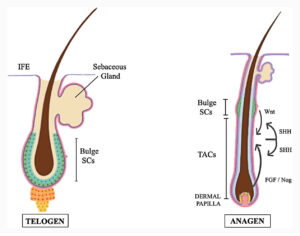Electrolysis vs. Laser Hair Removal: Comparing Effectiveness and Benefits
 In the quest for smooth, hair-free skin, individuals often find themselves weighing the pros and cons of various hair removal methods. Among the most popular techniques are electrolysis and laser hair removal. Both methods promise effective results but work in fundamentally different ways. This article will delve into the intricacies of each approach, comparing their effectiveness and benefits to help you make an informed decision about your hair removal journey.
In the quest for smooth, hair-free skin, individuals often find themselves weighing the pros and cons of various hair removal methods. Among the most popular techniques are electrolysis and laser hair removal. Both methods promise effective results but work in fundamentally different ways. This article will delve into the intricacies of each approach, comparing their effectiveness and benefits to help you make an informed decision about your hair removal journey.
Overview of Hair Removal Methods
Introduction to Hair Removal Techniques
When it comes to unwanted hair, consumers are often inundated with a plethora of hair removal methods. From traditional shaving to modern technologies like electrolysis and laser hair removal, each technique offers unique advantages and challenges. Understanding the intricacies of these methods is essential for tailoring the treatment to specific hair and skin types. For example, while some methods may work effectively on dark hair, others may struggle with lighter shades. This overview aims to clarify these techniques and set the stage for a deeper exploration into electrolysis and laser hair removal.
What is Electrolysis?
Electrolysis is a method of hair removal that employs electrical currents to target and destroy hair follicles, effectively inhibiting future hair growth. This treatment is particularly effective for individuals seeking permanent hair removal, regardless of hair color or skin type. Electrolysis works by inserting a fine probe into the hair follicle, delivering a small electrical charge that damages the follicle, preventing new hair from growing. Unlike laser treatments, electrolysis can be used on all hair colors and skin tones, making it a versatile option for a diverse range of clients.
What is Laser Hair Removal?
Laser hair removal, on the other hand, utilizes concentrated beams of light to target the melanin present in hair follicles. This method is often quicker than electrolysis, making it a popular choice for larger treatment areas. Laser hair removal may be most effective on dark hair and lighter skin types, as the contrast allows the laser to target the pigment more efficiently. As the laser damages the hair follicles, it disrupts their ability to produce new hair, leading to long-lasting hair removal results. However, it is essential to consider individual hair and skin types to determine the best approach for effective hair removal.

Photo by Farhad Ibrahimzade on Unsplash
Comparing Electrolysis and Laser Hair Removal
Differences Between Electrolysis and Laser Hair Removal
Electrolysis and laser hair removal are two distinct hair removal methods that cater to various preferences and needs. Electrolysis is a method of hair removal that utilizes electrical currents to destroy hair follicles, making it a suitable choice for permanent hair removal across all hair colors and skin types. In contrast, laser hair removal uses concentrated beams of light to target melanin in hair follicles, primarily working best on dark hair and lighter skin tones. While electrolysis may be more time-consuming due to its precision, laser hair removal offers a quicker approach, especially for larger treatment areas. Understanding these differences can help individuals decide which method aligns better with their hair removal goals.
Effectiveness of Each Method
The effectiveness of electrolysis and laser hair removal varies based on several factors, including hair type, skin tone, and individual hair growth patterns. Electrolysis is widely recognized for its ability to provide permanent hair removal results, as it successfully targets each hair follicle individually and inhibits future hair growth. However, laser hair removal may also yield effective results, particularly in cases where individuals have dark hair and lighter skin, as the contrast allows for more efficient targeting of the hair follicles. It’s essential to evaluate your specific hair and skin types when considering these hair removal treatments, as effectiveness can significantly differ based on these characteristics.
Permanent Hair Removal: Which is More Effective?
When discussing permanent hair removal, the choice between electrolysis and laser hair removal often comes down to individual preferences and biological factors. Electrolysis is the only FDA-approved method for permanent hair removal, making it a reliable option for those seeking long-lasting results. It works on all hair colors and skin types, including darker skin and light hair. On the other hand, laser hair removal may not guarantee permanent results for everyone; while it can significantly reduce hair growth, some individuals may experience new hair growth over time. Therefore, those considering either method should weigh the long-term effectiveness and potential maintenance required for their specific hair removal treatment.

“Cartoons of two distinct hair cycle stages (telogen and anagen) showing SCs (greenish cells) and their relative positions” by Cancedda R and Mastrogiacomo M is licensed under CC BY 4.0
Factors Influencing Hair Removal Choices
Skin and Hair Types Considerations
When deciding between electrolysis and laser hair removal, understanding the significance of skin and hair types is paramount. Each hair removal method interacts differently with diverse skin tones and hair colors. For instance, laser hair removal works best on individuals with dark hair and lighter skin, as the contrast allows the laser to effectively target the melanin in hair follicles. Conversely, electrolysis is a method of hair removal that can treat all hair types, including light hair and darker skin tones, making it a versatile choice for a broader demographic. Factors such as hair density, growth cycles, and individual skin sensitivities also play a crucial role in determining which hair removal treatment will yield the most effective results.
Hair Growth Cycles and Treatment Timing
Understanding hair growth cycles is essential when considering electrolysis or laser hair removal. Hair grows in phases: anagen (growth), catagen (transitional), and telogen (resting). For optimal results, both electrolysis and laser hair removal treatments should be timed according to these cycles. Electrolysis works by delivering electrical currents to hair follicles during the anagen phase, effectively destroying them and preventing future hair growth. Similarly, laser hair removal is most effective during this phase, as the laser can efficiently damage hair follicles. Scheduling your treatments to coincide with your hair growth cycles can significantly enhance the effectiveness of your chosen hair removal method, ensuring that you achieve the best possible hair removal results.
Cost Analysis of Electrolysis vs. Laser Hair Removal
When considering hair removal options, cost is a significant factor that influences many people’s decisions. Electrolysis may require more sessions and time compared to laser hair removal, which is often quicker than electrolysis when treating larger areas. However, electrolysis is the only FDA-approved method for permanent hair removal, which may justify its cost for those seeking long-lasting results. On the other hand, laser hair removal may offer more immediate results with fewer sessions, but the potential for new hair growth after treatment could lead to additional costs for maintenance. Evaluating the total cost of each treatment, including follow-up sessions, can help individuals make a well-informed decision that aligns with their hair removal goals and budgetary constraints.
Pros and Cons of Each Method
Benefits of Electrolysis Hair Removal
Electrolysis is a trusted method of hair removal that offers several benefits, especially for those seeking permanent solutions. One of the primary advantages of electrolysis is its ability to effectively remove hair from all skin tones and hair colors, including lighter hair and darker skin. This versatility makes it an ideal choice for a diverse range of clients. Additionally, electrolysis targets individual hair follicles, ensuring that each hair is addressed, which can lead to long-lasting hair removal results. With its FDA approval for permanent hair removal, many individuals find reassurance in its effectiveness.
Advantages of Laser Hair Removal
Laser hair removal boasts several advantages that make it an attractive option for those looking to eliminate unwanted hair quickly. One of the key benefits is the speed of treatment; laser hair removal sessions are often quicker than electrolysis, especially for larger treatment areas. As the laser specifically targets melanin in hair follicles, it works most effectively on dark hair and lighter skin types, making it a popular choice for many. Furthermore, laser hair removal may yield significant results in fewer sessions compared to other hair removal methods, potentially appealing to those with busy lifestyles.
Potential Side Effects and Risks
While both electrolysis and laser hair removal are generally safe, it’s essential to be aware of potential side effects and risks associated with each method. Electrolysis may cause temporary redness, swelling, or discomfort at the treatment site, which typically subsides shortly after the procedure. On the other hand, laser hair removal may lead to skin irritation, changes in pigmentation, or even blistering in some cases. Individuals with darker skin may experience heightened sensitivity to laser treatments. It’s critical to discuss these risks with a professional to determine the safest approach based on skin type and hair characteristics.
Making an Informed Decision
Choosing Between Electrolysis or Laser Hair Removal
Making a choice between electrolysis or laser hair removal involves evaluating personal preferences, hair and skin types, and desired outcomes. Individuals with light hair or those who wish to remove hair from all areas may find electrolysis to be the more suitable option due to its effectiveness across various hair colors and skin tones. Conversely, those with dark hair and lighter skin may benefit more from laser hair removal, which can provide quicker results with fewer sessions. Ultimately, understanding the unique attributes of both methods can guide individuals toward the best hair removal treatment for their specific needs.
Consultation and Professional Advice
Consultation with a qualified professional is essential when considering hair removal options like electrolysis and laser hair removal. A practitioner can assess individual hair and skin types, providing tailored recommendations that align with each person’s goals. During the consultation, potential clients should inquire about the specific hair removal procedure, expected outcomes, and any side effects. This professional guidance ensures that individuals are well-informed and can make confident choices about which hair removal method suits them best, ultimately enhancing their overall experience and satisfaction with the treatment.
Post-Treatment Care for Hair Removal
Post-treatment care plays a crucial role in the effectiveness and safety of hair removal methods, including electrolysis and laser hair removal. After electrolysis, it’s advisable to avoid sun exposure and refrain from using harsh skincare products on the treated area to minimize irritation. For laser hair removal, keeping the skin cool and applying soothing creams can help alleviate any discomfort experienced post-session. Additionally, following up with the recommended treatment schedule is vital to ensure the best hair removal results and to manage any potential new hair growth effectively.
What is the difference between electrolysis and laser hair removal?
The main difference between electrolysis and laser hair removal lies in their methods of targeting hair follicles. Electrolysis is a method of hair removal that uses electrical currents to destroy hair follicles, making it effective for all hair types and skin tones. In contrast, laser hair removal uses concentrated light beams to target dark hair against lighter skin. Each method has its unique strengths, making them suitable for different individuals and their specific hair removal needs.
Which method is more effective for permanent hair removal?
Both electrolysis and laser hair removal can lead to long-lasting results, but electrolysis is the only FDA-approved method for permanent hair removal. This is because it effectively destroys hair follicles regardless of hair color or skin type. Laser hair removal may also provide long-term reduction in hair growth, but it typically requires ongoing maintenance sessions, especially for individuals with lighter hair or those with darker skin tones.
How does the effectiveness of laser hair removal compare to electrolysis?
The effectiveness of laser hair removal can be quicker than electrolysis, as laser hair removal treatments cover larger areas in shorter timeframes. However, electrolysis is highly effective for all hair types and can treat individual hair more accurately. This means that while laser hair removal may be faster, electrolysis may be the better choice for those needing precise hair removal in smaller or sensitive areas.

